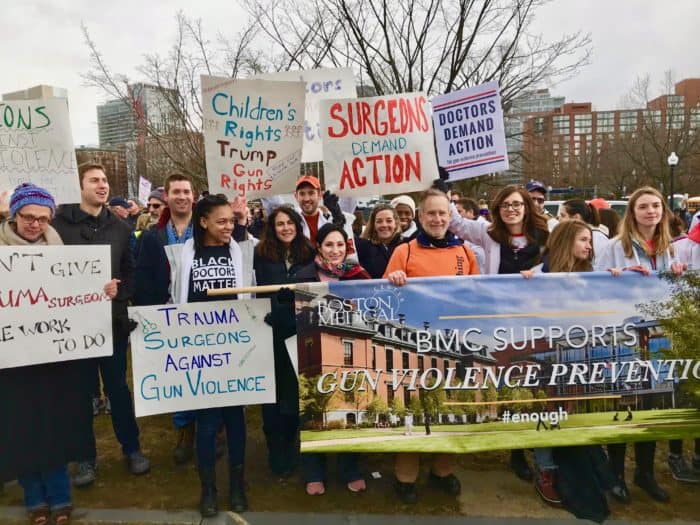As a trauma surgeon at New England’s busiest trauma center, I see the devastating injuries that can happen to anyone, at any time. One day, I might take care of a teenager with a traumatic brain injury after her car crashes on prom day. The next day, I’ll insert a tube between a worker’s ribs to remove blood and air from around their lung after they fell off a roof at a construction site. And of course, those days feel more manageable when juxtaposed with caring for a patient who lost both legs from a bomb blast that shook Boylston Street, in Boston.
I trained for many years to become a trauma surgeon, completing medical school, a residency, and a fellowship. But, looking back on my education in light of my patients, I have learned that taking care of my patients means more than just performing a surgery. If I want to improve their health and well-being, I must address the realities of their social circumstances.
Every day, I see patients whose home, community, or environment negatively affects their health, and these invisible yet critical issues need to be addressed. I remember an elderly woman whose wound would not heal when she left the hospital because she did not have access to healthy food. A young man who could not afford antibiotics was readmitted to the hospital with worsening diverticulitis that required an emergency surgery.
Too many people view surgeons as doctors who enter the fray to provide a quick fix. My work reaches far beyond the walls of the operating room. At essential hospital Boston Medical Center, I started the Socially Responsible Surgery group to incorporate targeting social needs into how surgeons treat patients. By giving surgeons the tools to screen their patients for social determinants of health, including food and housing insecurity, we can better tailor our treatment plan based on their social needs. This means that, if we know a patient is homeless, we can help connect the patient to housing resources as part of the discharge plan. If we know a patient is having trouble accessing healthy food, we can make sure the discharge plan includes a prescription for a visit to our hospital preventive food pantry.

Far too many students come to medical school with that “quick fix” view of surgeons. However, that mindset needs to change to truly make a difference. They should not be surprised to find us working so hard outside the operating room to help our patients heal. Socially Responsible Surgery works to educate and engage future generations of physicians about the importance of addressing the social determinants of health to provide holistic care.
But much more needs to be done. Current and future surgeons must understand and appreciate the effect social issues have on the health of our patients and our communities. As surgeons, we can play a major role to help strengthen our health care systems, not only to treat but also to prevent illness and injury.
We are not in this alone. Society must demand exceptional care and compassion for all patients. If we don’t all work together to confront the realities that complicate the health of our communities, we’re simply applying tourniquets and ignoring the actual cause of the bleeding.
Essential hospitals across the country provide compassionate care for their patients by targeting the social and economic factors that influence health. Learn more about their efforts and share your own hospital’s initiatives at essentialcommunities.org.
Tracey Dechert, MD, is a trauma surgeon at Boston Medical Center.